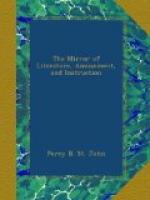Yet few and fleeting as they were,
Fancy and feeling picture
this,
They prompted many a fervent prayer,
Witnessed, perchance, a parting
kiss;
And might not kiss, and prayer, from thee,
At such a period, profit me?
Whether they did or not, I owe
At least this tribute to thy
worth;
Though little all I can bestow,
Yet fond affection gives it
birth;
And prompts me, as thy shade I view,
To bless thee, whom I never knew!"[1]
His father died before Mr. Barton was seven years old; but his second marriage, which took place a few months before his death, provided an excellent parent for his children: to her, and to his two sisters,[2] both several years older than himself, our author owed infinite obligations.
His education at one of the quaker seminaries was, of course, plain and circumscribed, being pretty much confined to useful, indeed necessary, branches of knowledge. But his father had been a man of greater natural and more cultivated intellect than many; he had read much, and on the abolition of slavery, in which he was one of Clarkson’s earliest associates, he had, on several occasions, proved that he could write well, though, we believe, he was never avowedly an author. He had left no despicable collection of books, so that in his school vacations ample means were afforded to his son of indulging his taste for reading. A pleasing tribute to the memory of Mr. Barton’s father will be found in his Napoleon and other Poems.
In the year 1806, Mr. Barton took up his residence in the pleasant town of Woodbridge, in Suffolk, and commenced business as a merchant; but an unlooked-for domestic affliction of the severest kind was about to visit him, and his wordly prospects were to receive an irrecoverable shock,—the loss of his amiable wife, before they had been married a twelvemonth, and soon after the birth of her child! This excellent woman, to whom our poet was, for so short a time, united, gave rise to some of his best pieces, particularly to the poem beginning, The heaven was cloudless,[3] and that entitled A Portrait, in Napoleon and other Poems. In this last piece the poet no less beautifully than truly observes,—
To sympathies, which soothe and bless
Our life from day to day,
Which throw, with silent tenderness,
Fresh flowers across our way,
The heart must ever fondly cling:
But can the poet’s sweetest string
Their loveliness display?
No—nor could Titian’s
self supply
Their living presence, once gone by.
The air, in which we breathe and live,
Eludes our touch and sight;
The fairest flowers their fragrance give
To stillness, and to night;
The softest sounds that music flings,
In passing, from her heaven-plumed wings,
Are trackless in their flight!
And thus life’s sweetest bliss is
known
To silent, grateful thought alone.




